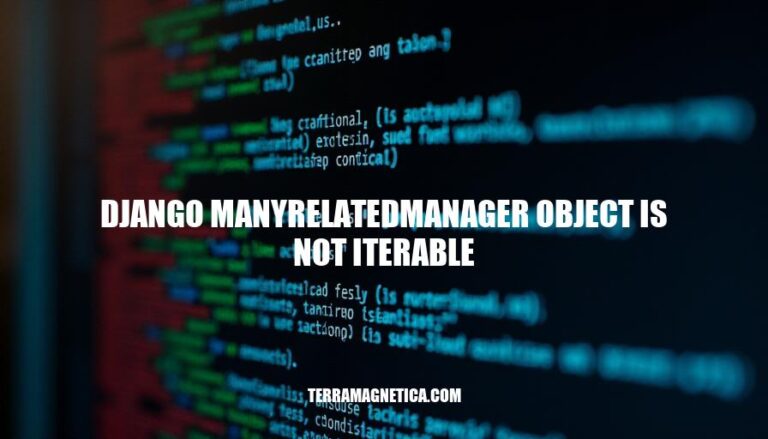


In Django development, the error “ManyRelatedManager object is not iterable” occurs when you try to iterate over a ManyRelatedManager object directly. This object manages many-to-many relationships and returns a QuerySet, which is not inherently iterable. To iterate over the related objects, you need to use methods like .all() to retrieve the QuerySet in an iterable form. Understanding this concept is crucial for efficiently handling many-to-many relationships in Django applications.
In Django, a ManyRelatedManager is a special manager used to handle many-to-many relationships between models. When you define a ManyToManyField in a model, Django automatically creates a ManyRelatedManager to manage the related objects. This manager provides methods to add, remove, and query related objects efficiently.
For example, if you have a Pizza model with a ManyToManyField to a Topping model, the ManyRelatedManager allows you to easily add toppings to a pizza, remove them, or query which toppings are associated with a specific pizza.
The error occurs because a ManyRelatedManager object, which manages many-to-many relationships in Django, does not directly return a list of objects. Instead, it returns a QuerySet object.
A QuerySet is a collection of database queries that can be iterated over, but the ManyRelatedManager itself is not iterable. To iterate over the related objects, you need to call the .all() method on the ManyRelatedManager to get a QuerySet that you can then loop through.
For example:
# Incorrect
authors = book.authors
for author in authors:
print(author.name)
# Correct
authors = book.authors.all()
for author in authors:
print(author.name)
This way, you convert the ManyRelatedManager into an iterable QuerySet.
Here are common coding scenarios where developers encounter the 'django manyrelatedmanager object is not iterable' error:
Direct Iteration Over ManyRelatedManager:
post = BlogPost.objects.get(id=1)
for tag in post.tags:
print(tag.name)
Error: 'ManyRelatedManager' object is not iterable.
Using ManyRelatedManager in Templates:
<div class="tag-list">
{% for tag in post.tags %}
<span>{{ tag.name }}</span>
{% endfor %}
</div>
Error: 'ManyRelatedManager' object is not iterable.
Passing ManyRelatedManager to Functions Expecting Iterables:
def print_tags(tags):
for tag in tags:
print(tag.name)
post = BlogPost.objects.get(id=1)
print_tags(post.tags)
Error: 'ManyRelatedManager' object is not iterable.
Using ManyRelatedManager in List Comprehensions:
post = BlogPost.objects.get(id=1)
tag_names = [tag.name for tag in post.tags]
Error: 'ManyRelatedManager' object is not iterable.
In each case, the solution is to use the .all() method to convert the ManyRelatedManager to a QuerySet:
tags = post.tags.all()
for tag in tags:
print(tag.name)
This converts the ManyRelatedManager to an iterable QuerySet.
To iterate over a ManyRelatedManager in Django and avoid the ‘not iterable’ error, follow these best practices:
Use .all() Method:
related_objects = some_model.related_objects.all()
for obj in related_objects:
# Your code here
Use .iterator() Method:
related_objects = some_model.related_objects.iterator()
for obj in related_objects:
# Your code here
Use .values() Method:
related_objects = some_model.related_objects.values()
for obj in related_objects:
# Your code here
These methods convert the ManyRelatedManager into an iterable form, allowing you to loop through the related objects without errors.
The error ‘ManyRelatedManager object is not iterable’ occurs when trying to iterate over a ManyRelatedManager object directly in Django development. This happens because the ManyRelatedManager returns a QuerySet, which is not inherently iterable.
To fix this, use methods like .all() to retrieve the QuerySet in an iterable form. A ManyRelatedManager is a special manager used to handle many-to-many relationships between models and provides methods to add, remove, and query related objects efficiently.
The error can occur in various scenarios such as direct iteration over ManyRelatedManager, using it in templates, passing it to functions expecting iterables, or using it in list comprehensions. To avoid the ‘not iterable’ error, use the .all() method, .iterator() method, or .values() method to convert the ManyRelatedManager into an iterable form.